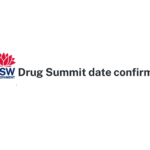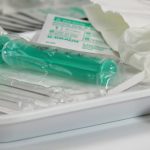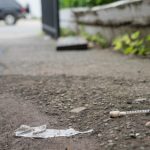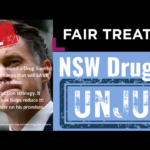Taking Pollies on a Journey: Uniting’s Emma Maiden on the Promise of the NSW Drug Summit
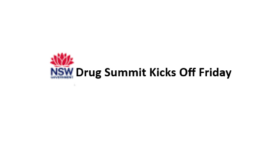
The long-sought-after 2024 NSW Drug Summit will open this Friday in the southwestern regional town of Griffith, prior to moving on to the Northern Rivers town of Lismore for a day of hearings next Monday, and over the 4th and 5th of December, it’s final two days will take place in Sydney.
Uniting has been one of the key organisations behind the push for the summit, and its advocating has been of particular note ever since NSW premier Chris Minns made comments to the Murdoch press in August 2023 that sounded like he was attempting to put the idea in the too-hard basket.
But as former NSW premier Bob Carr explained during the 2022 Drug Policy Australia forum in Sydney, despite being the leader that facilitated the 1999 NSW Drug Summit, he was not onboard with drug law reform until he spoke to key Sydney drug law reformist Dr Alex Wodak.
And as Uniting general manager advocacy and external relations Emma Maiden advises, the importance of the summit is that it will put the evidence directly to members of NSW parliament with the aim of taking them on a journey to have the realisation that drug law reform is needed.
Removing criminal sanctions
There is a smorgasbord of reforms the AOD (alcohol and other drugs) sector would like to see progressed following the summit. These include issues around regional drug rehabilitation and treatment, sniffer dog use, pill testing, as well as decriminalisation and the NSW diversion scheme.
Uniting launched Fair Treatment in 2018. It’s a campaign that aimed to establish drug decriminalisation in both NSW and the ACT. And half its aim, ACT decriminalisation, was realised on 28 October 2023, and a year on, news reports state that there’s been no adverse impact.
Decriminalisation involves the removal of criminal sanctions for personal drug possession and use. In the wake of two inquiries recommending the reform, the Minns government instead implemented a drug diversion scheme in February that permits arrest or diversion via a fine or counselling.
But as NSW Greens MLC Cate Faehrmann revealed in September, the first six months of the program saw NSW police officers continue to arrest and charge, rather than divert, 6,332 civilians, while only 436 were diverted, and of them, only 21 chose to take the free counselling session.
A precedent set
A lot of faith is being placed in the upcoming summit, as its 1999 predecessor set a precedent that such sharing of experiences can lead to changes in opinion in ministers at the highest level that then can lead to the implementation of reforms that might usually be considered politically dangerous.
The first NSW drug summit led to the establishment of the Uniting Medically Supervised Injecting Centre in Kings Cross, and it further saw a change of attitude towards illegal drugs and harm minimisation, and studies have found less drug-related harms and deaths in NSW as a result.
Sydney Criminal Lawyers spoke to Uniting NSW.ACT general manager advocacy and external relations Emma Maiden about the key reforms her organisation wants to see prioritised, how the four-day event is being coordinated and why the outcome of a summit is likely more impactful than an inquiry.
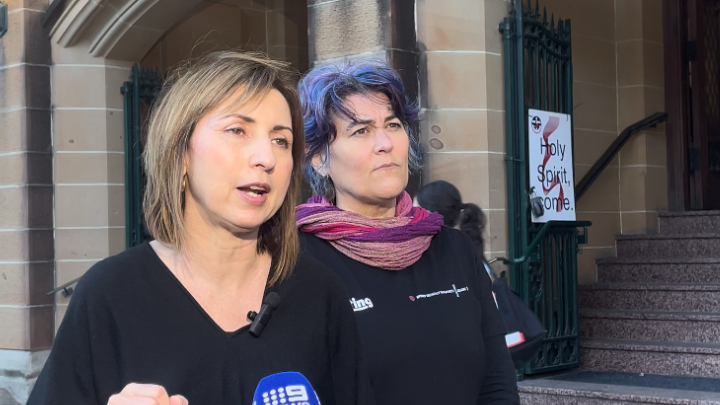
The NSW Drug Summit was announced in July with four dates secured over November and December. The first meeting will take place in Griffith this Friday.
Emma, what has happened in the interim to make the summit go ahead? And what are you expecting to happen at the two regional dates in Griffith and Lismore in the coming days?
In terms of what has happened in the interim, we know NSW Health has been working hard to pull the event together, which includes ensuring the right people are in the room. In the regional areas there aren’t as many MPs invited to those days.
Local MPs are invited and there are key ministers attending. But those regional days are not just about Griffith and Lismore. They are meant to be representative of regional issues generally.
Health has been consultative about who should be in the room. So, organisations like our Fair Treatment campaign, Uniting, NADA and others that wanted to be involved will be there.
We are expecting there will be experts, as well as local people with lived experience. There will be local service providers. And the Lismore mayor will be there, and I’m assuming also the Griffith mayor.
There is an agenda out as well. So, the day will be streamed into five focus areas that the government has identified, and there will be some plenary speakers, as well as workshops to try to identify solutions. Both the co-chairs Carmel Tebbutt and John Brogden will be there as well.
How this will be uplifted and reflected at the end of the day is something that is still not completely clear to me. There is recognition that there needs to be something, whether or not that is a communique or a record of the day. That’s the point I’m still not completely sure on.
Even though, we’ve had the ice inquiry and other inquiries, it’s clear that this is the process the government wants people to go through in order to look at what changes are necessary in NSW, and we’re all in good faith leaning into that process.
There are no hidden agendas, nothing is off the table and people are generally open to solutions.
So, the regional days, this Friday 1st November in Griffith and Monday 4th in Lismore, will be followed by two days in Sydney, Wednesday 4th December and Thursday 5th, which I presume will be held at NSW Parliament House on Macquarie Street.
Sadly, the two days in December will not be at NSW parliament. It’s being held at the ICC (the Sydney Convention and Exhibition Centre). This summit will be larger than the previous drug summit. And there is a capacity restraint at NSW parliament.
I do think that’s a shame because it will reduce MP engagement. But I understand communications have gone out to members of parliament strongly encouraging them to attend and that will ramp up over November.
There is a role for the media too in encouraging people to be in the room who are going to be possibly voting on legislation to reflect the outcomes.
We have had a lot of discussions with MPs too, encouraging them to be there for the two days. And it is certainly the expectation that the cabinet will be there for the two days.
Again, there is a lack of clarity in my mind about how the insightful views of such a large group are going to be drawn together. We know the two co-chairs will issue a report in February 2025.
But there definitely will be a desire for the participants in the drug summit to feel that they have strongly indicated their views, so how to get this done is going to be a challenge for the chairs to get right.
So, the 2024 NSW Drug Summit is coming on the back of significant inquiries, like the ice inquiry and the NSW coronial report into six drug-related deaths at music festivals, both of which made many recommendations for reforms that are still outstanding.
What is likely to be on the agenda of the summit this year? What is Uniting hoping to see achieved?
There will be a spotlight on the diversion scheme that NSW has already implemented: the EDDI (the Early Drug Diversion Initiative). The data relating to EDDI is terrible in terms of implementation.
The latest data is 436 diverted versus 6,332 charged over the six months. So, NSW needs to grapple with how we want to deal with people who are caught in possession of small amounts of drugs.
We’ve already started this diversion experiment, and I would call it Diversion Lite.
There are barriers stopping it from becoming a more comprehensive model, and that is that police officers can still charge people.
If they didn’t have the ability to charge people, they would have to divert or do nothing, they would still have discretion.
That will be a big issue. The diversion system and how we can do that better to create an opportunity for those who might not be frequently using drugs to receive education about them, or for people who might be experiencing drug dependency issues, it would create a means to have a real discussion around those issues.
Another thing is we run the injecting centre in Kings Cross. But we know injecting drug use happens all around NSW.
Right now, section 36A of the Drug Misuse and Trafficking Act 1985 (NSW) says that the state can only have one injecting centre and it has to be at the current address in Kings Cross and if you want another one, you have got to close that one.
What we would like to do is abolish that section of the Drug Misuse Act to allow for local health districts, who have evidence of public injecting, public overdose and public discards to makes a decision about whether they would like to perhaps co-locate a very small safe injecting space with a needle syringe program, so that people who are already going to that service to get their clean equipment, but are then leaving and injecting in nearby toilets or carparks, can stay and have their injections supervised.
That would free up local decision-making processes that are based on evidence to decide on whether or not it’s appropriate for that community to have a safe injecting facility.
That is another big change we would like to see. We know Lismore is very keen to have a safe injecting facility. But it would be based on the evidence.
We listened to the evidence of health practitioners during COVID, we should listen to the evidence about this now.
This won’t be appropriate for every community but we do have this network of needle syringe programs giving out clean equipment all around the state and just sending people into the shadows and we are really missing the opportunity there to prevent overdose because we know safe injecting facilities prevent people from dying and provide an opportunity to create a change in the relationship with those injecting drug users because we also know that injecting centres create pathways for referrals into treatment, when they can actually spend a bit more time with that person.
We also do really strongly support pill testing. One life saved by pill testing is incredibly important, but we feel the overall impact is not talked about enough.
Pill testing is a tailored health intervention and health education moment for people who have purchased drugs with the intention of taking them.
We can talk about doing TV adverts and going into school and all the rest, that kind of blanket education.
But if we created fixed community pill testing and mobile pill testing that operates at festivals then we would have an amazing opportunity to engage and have drug education and health interventions with people who have purchased drugs with the intention of taking them.
That is the reason, one of the strongest reasons, to support pill testing from our point of view.
We know that there are pockets of unmet need for treatment, and we think that is where the government starts with new investment.
We did have the $358 million in funding for treatment announced by the previous government. We are not satisfied that it met the unmet need sufficiently.
In regional communities, in Griffith and Lismore, this will be spoken about a lot. These communities have a huge unmet need, and it isn’t necessarily building a rehab, although they definitely need residential rehab, it is about talking about patient services, access to GPs willing to do treatment programs and access to chemists that dispense methadone.
We would also like to see the introduction of new types of opioid treatment therapy. We did a pilot with St Vincent’s and the University of NSW on some short acting syntenic heroin. And that was incredibly successful.
Often people were long term injecting drug users. They have tried methadone and other treatment programs, but it just doesn’t work.
What they need is a short acting injectable opioid, which is as close to what they would have on the street, but within a treatment environment that really breaks the cycle of having to score drugs and then use, and then score drugs and use.
That opens up their lives to what they could be like beyond that cycle, and it opens their eyes to then create a pathway back into more standard treatment programs.
This is much cheaper than residential rehab, and it is only going to be a very small proportion of the population.
We’ve piloted it. The results are still with the academics, but the evidence is that it was lifechanging for the 20 or so long-term injecting heroin users who have tried many times over decades of use to stop and this was the thing that made the difference.
This is used in Europe. It is a standard treatment and a proven therapy, but we were proving that we could implement it within a treatment facility.
We also need more culturally appropriate treatment. And of course, that is First Nations, but it is also other communities.
We know in western Sydney there is a particular Islamic treatment centre that’s operated and there are other ethnic communities that would like to have more culturally appropriate treatment.
Then, of course, this isn’t set and forget: let’s just do one round of reforms and not do anything more.
We do need a comprehensive AOD strategy in NSW. The previous one is over 20 years old.
The new one needs to be a focus for government and that needs to also join up with other areas of government that are essential for disrupting entrenched disadvantage.
We do know that drug dependency is often part of a complex web of trauma and disadvantage. It isn’t always. But it can be.
So, we need to ensure that we have really good early intervention programs. There are young parents that might be struggling with multiple issues, including drug dependency, so we need to invest in housing.
If we have a comprehensive alcohol and other drug strategy, we can better link it up with the other investments that the government needs to make to disrupt entrenched disadvantage and stop these cycles that are for too long allowed to rinse and repeat, for generation after generation.
I did want to ask in regard to the NSW drug diversion program that is failing, how do you consider the policy of drug decriminalisation in the Australia Capital Territory coming to its one year anniversary right before the NSW Drug Summit kicks off.
The 2018-launched Fair Treatment campaign had a focus on seeing the roll out of drug decriminalisation in the ACT and in NSW as a goal.
The ACT has had decriminalisation in place for a year now, and the news reports state that no adverse outcomes have resulted.
So, how do you consider the discussion around the Early Drug Diversion Initiative will go, now that we have the evidence from a local scheme where people are no longer sanctioned criminally for being in possession of a personal amount of an illicit substance?
It is so helpful to have the ACT on our doorstep. A lot of people support decriminalisation, like Uniting and the Fair Treatment campaign. But we do talk about Portugal a lot and I think sometimes people get a bit sick of it.
You will never be able to lift completely one system and drop it into another. The best thing to do is to listen and to learn from those other experiences and to choose the elements that you want.
But we have the ACT right on our doorstep here. And we should be learning from the way that they did it. There implementation isn’t perfect. But they have worked much more closely with groups with lived experience down there.
They have talked a lot about needing to reform their approach to policing. And that was a huge thing also in Portugal, when they introduced decriminalisation there. They did a massive reform of their approach to policing.
We do have cultural issues with policing and it’s an issue we need to tackle. So, we should be learning from the ACT. We should be learning from Queensland. We should be learning from South Australia.
I’ve talked to the national police union about all the different drug policing models in the states and territories, and it shocks me that the different police forces are not talking to each other more about how the policing of drugs is going and how it is impacting.
We don’t want to make police officers lives harder. They are already talking about how too often they are at the other end of the line when all of the other social systems fail, and how unfair that is and how they are not prepared and trained for it.
We need to learn from each other in Australia and overseas. I am hoping that there will be some evidence coming from the ACT being brought to the drug summit. One year is early but still there are certainly things to learn.
We shouldn’t let the fact that EDDI and the decriminalisation model in the ACT are so new that we don’t admit that EDDI isn’t working. We don’t need to wait one year or two years on that, we need to act now.
And lastly, Emma, the 1999 NSW Drug Summit was effective in seeing reforms implemented that were not at face value politically popular. This included establishing the Uniting Medically Supervised Injecting Centre in Kings Cross.
Why is the drug summit different from other inquires? Why have Uniting, drug law reformists and harm reduction advocates all been particularly focused on having a summit rather than some other form of inquiry?
It’s getting the people in the room. Inquiries, if you talk to Ice Commissioner Dan Howard, he came in with certain views and he, after hearing all that evidence, went through a massive transition of his own personal views, and he came out recommending things that he never would have expected he was recommending in the beginning.
But when we have a parliamentary system, we do need to take the bulk of the parliament on a journey as well. The 1999 NSW Drug Summit definitely did that, it took the politicians on a journey.
Hearing those stories of people with lived experience about the impact, the criminalisation of drugs and our laws and our systems of drugs have had on them, hearing that firsthand is really impactful.
We want to build a consensus, and we want to build bipartisan support for the kind of change that will allow us to really make a difference to communities, people and families in NSW that are currently really suffering because of the way we are not dealing with our drug laws that don’t work and how our resourcing of treatment just doesn’t work.
It’s about building that consensus, so you can then take that into parliament and pass the big changes, like the medically supervised injecting centre was after the previous drug summit.
So, it is more impactful, but we’ve got to be present in the room and the MPs have to be there if they want to have that impact, they really need to take the time to be in the room.
A lot of people are going to put their necks out telling very personal stories about how current laws and systems have impacted their families and they need to honour that by being there.


